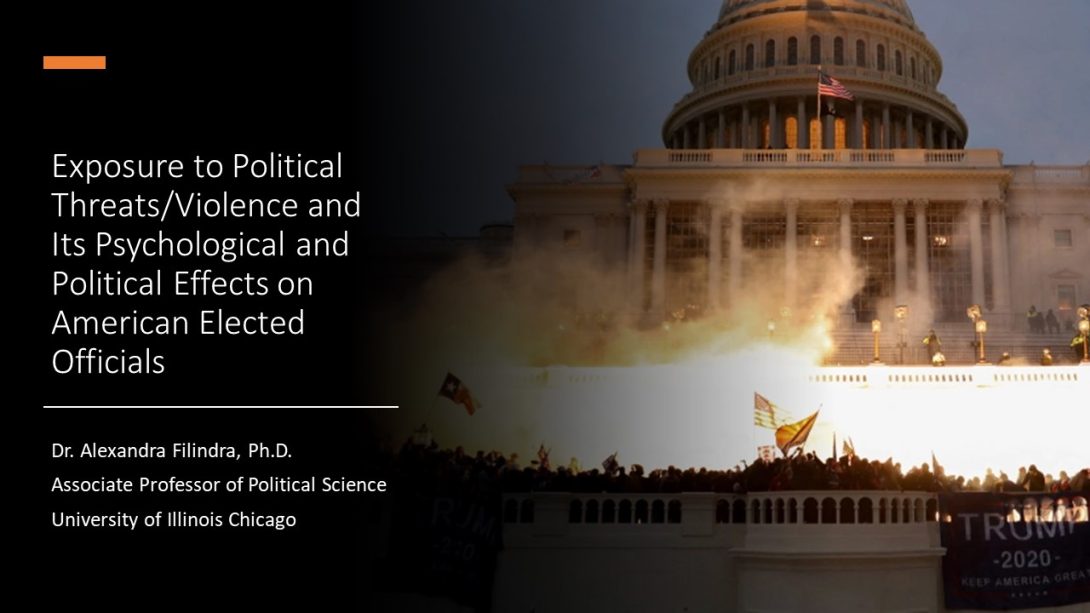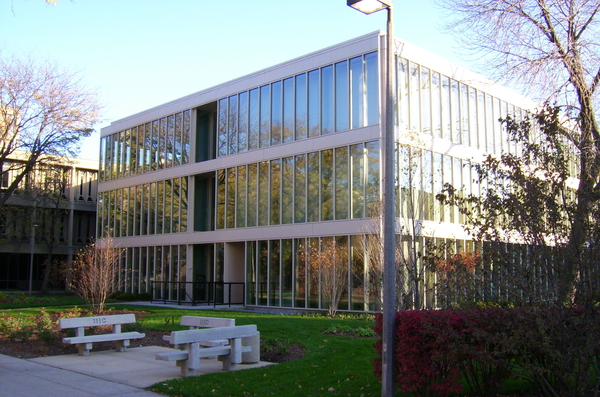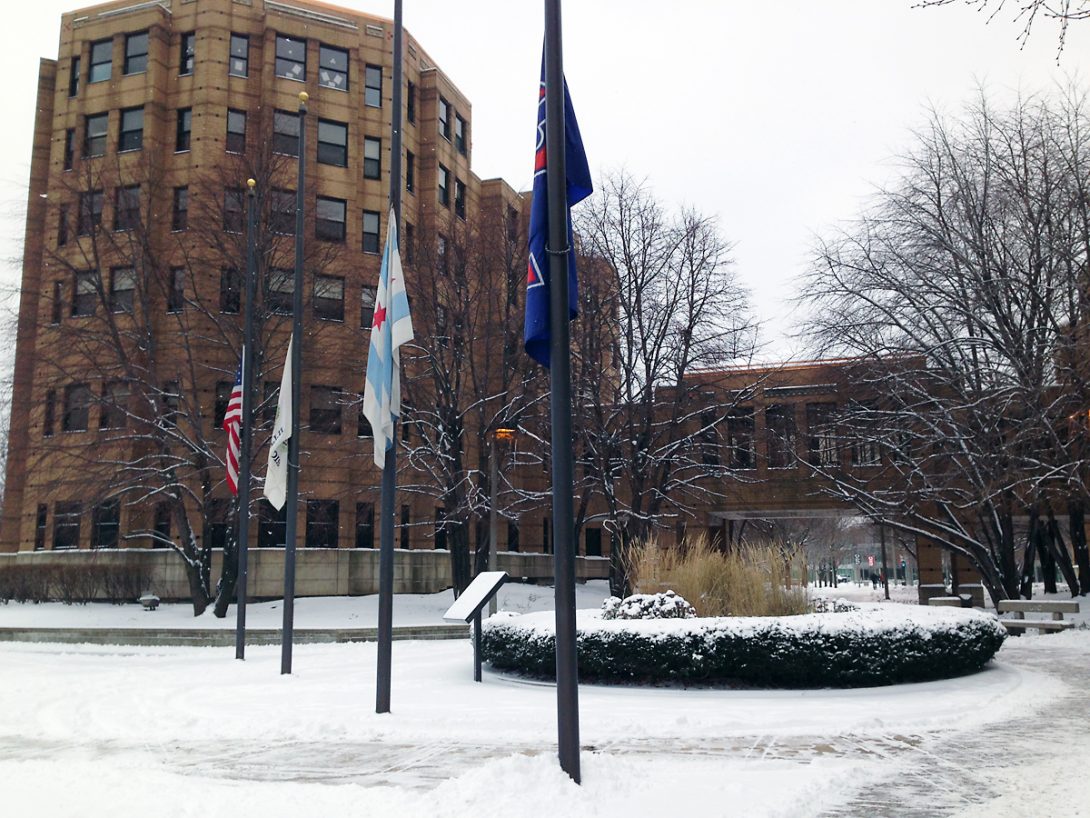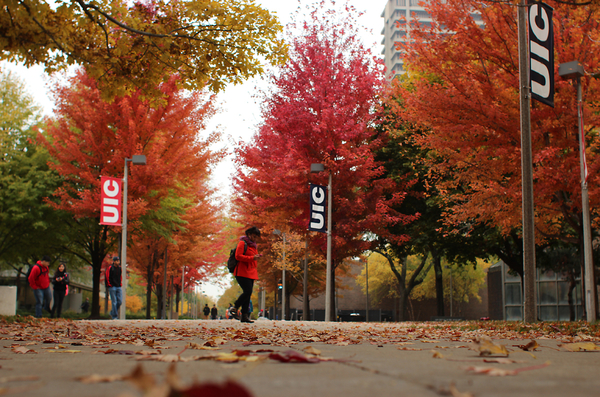Featured Faculty Research
Russell Sage Foundation Funding for Assessing Exposure to Political Threats/Violence and Psychological and Political Effects on American Elected Officials

The purpose of this study is to investigate the prevalence of political threats/violence against America’s elected officials and the personal and professional effects that direct and vicarious (i.e., through the experiences of colleagues and members of professional networks) exposure to threats/violence may have on elected representatives. With support from the Russell Sage Foundation, Dr. Alexandra Filindra will draw on research in organizational psychology that focused on toxic workplaces to propose several key mechanisms that may mediate the effect of exposure to threats/violence, hypothesizing that direct and vicarious exposure to threats/violence may affect the behavior of elected officials in several ways, including 1) their campaign style (e.g., willingness to host public events for constituents); 2) their issue advocacy (i.e., the types of issues they champion); 3) their views on public office and willingness to stay on the job (ambition). To do so, Dr. Filindra will carry out a multi-phase research project to help understand 1) the variety of threats/violence to which people are exposed (directly or vicariously), and 2) the psychological and behavioral responses to these experiences.
National Science Foundation Award for Improving Ethics in Violence Research

Over the past decade, there has been a proliferation of research involving human participants on the topic of violence in the social and behavioral sciences. Understandably, researchers and IRBs are often concerned that asking participants about their past experiences with violence could lead to distress or retraumatization, and that the costs to participants of such research may outweigh the benefits. In this project, Dr. Rebecca Littman will: i) generate internally valid, generalizable evidence on the harms, benefits, and regret associated with participating in violence research for both respondents and interviewers; and ii) develop new guidance for researchers across disciplines and other research stakeholders for how to make informed decisions about the potential costs and benefits of research on political violence. To do so, Dr. Littman will carry out a multi-site field experiment in Mexico, Nigeria, and Colombia, and conduct a survey with a sample of interviewers who routinely ask respondents about their experiences with violence.
Russell Sage Foundation Funding for Assessing Local Immigrant Detention on Police Arrests

Amid punitive shifts in criminal justice and immigration control in the 1980s and 1990s, Latinx individuals made up a growing share of the incarcerated population in the U.S. These disparities intensified during the country’s “War on Drugs,” which resulted in the disproportionate arrest of young Black and Brown men. With the support from a Russell Sage Foundation Pipeline Grant, Dr. Ashley Muchow will investigate whether a similarly punitive turn in immigration control over this period – which featured the use of local jails to detain deportable noncitizens – aggravated ethnic arrest disparities. Using county-level arrest data from California between 1980 and 2004, she will examine whether the adoption of intergovernmental service agreements to detain immigrants in local jails increased rates of Latinx arrest.
The Russell Sage Foundation Pipeline Grant supports early- and mid-career tenure-track scholars who are underrepresented in the social sciences and promotes diversity broadly, including racial, ethnic, gender, disciplinary, institutional, and geographic diversity.
Social-insurance Undergraduate Research Fellowship (SURF)

The Social-insurance Undergraduate Research Fellowship (SURF) is a competitive, four-week, in-person program housed at UIC coordinated by Dr. Erik Hembre, Assistant Professor of Economics, University of Illinois-Chicago. The program, which will last from May 16th through June 10th, meeting on MWF from 9am-1pm (in-person), will provide promising undergraduate students with an introduction to social insurance; the policies surrounding the social safety net; research investigating these, and their impact on economically vulnerable populations.
Following the four-week fellowship, SURF fellows will intern (virtually) with researchers currently funded to investigate these topics. The program is especially interested in attracting students from historically underrepresented groups in economics and public policy. If professors have students they think would be a great fit for the program, please visit the program website or email Dr. Erik Hembre.
Fragments of History: Reconstructing Blas Valera’s Lost Historia Occidentialis

Centuries of wars, fires, and social upheavals have destroyed many of the most important documents written during the Early Colonial Period of the Americas. This NEH-funded project, directed by Dr. Brian Bauer, will reconstruct parts of a lost chronicle titled Historia Occidentialis (History of the West) which was completed in 1596 by Blas Valera, an elusive and controversial Jesuit chronicler. By recording the preserved sections of Valera’s work, we will see Valera as a major author in his own right and will have direct access, for the first time, to a newly “recovered” colonial period source which will aid us in understanding the history of the Andean region.
NSF Funding for Study of Advances in Skin Color Measurement

Skin color has stood as a protected category since the Civil Rights Act of 1964, but our understanding of disparities by skin color is only as good as the data on skin color itself. As such, poor measurement in this case renders invisible a dimension of inequality that has been illegal for half a century. With support from the National science Foundation (NSF), this three-year project, led by Dr. Rachel Gordon, advances knowledge of how skin color can best be measured, with the objective of helping researchers identify inequalities by skin color in health and social outcomes.
NIH Funding for Study of Rape Victims’ Support

Rape is a major public health issue affecting an estimated 20% of American women in their lifetimes and costing billions of dollars each year due to harmful outcomes — like problem drinking, depression or poor physical health — associated with these experiences, according to previous research on the matter. With the help of a three-year grant from the National Institutes of Health (NIH), Dr. Sarah Ullman leads a study that aims to better understand how support processes from social networks impact victims’ adjustment, such as post-traumatic stress disorder (PTSD), drinking, and relationship quality.
Race and Political Trust in an Age of Cynicism

Funded by the Russell Sage Foundation, “Race and Political Trust in an Age of Cynicism” examines how four major racial/ethnic groups in two very diverse metropolitan areas in California and Illinois understand the trustworthiness of government in a historic moment of political polarization and cynicism. National and state polls consistently show that individuals today are four times more likely than they were 50 years ago to convey distrust in government institutions, including Congress and the Office of the President. This study, led by Dr. Julie Dowling, draws on original qualitative and quantitative data to reveal the social, political, and cultural factors that undergird this distrust across US racial groups.
LAS-CSSR Featured Research
Would you like your ongoing research project to be featured on the LAS-CSSR website? If so, please fill out the form here and the committee will respond. If you have any questions, reach out to the LAS-CSSR.